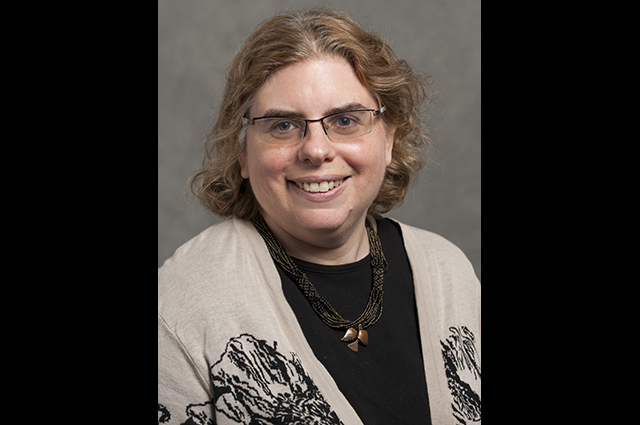Cowen elected ISCB Fellow

Professor Lenore Cowen of the Department of Computer Science was recently recognized as a Fellow of the International Society for Computational Biology (ISCB). Cowen joins 15 other Fellows this year who were nominated for their prominence and excellence in the fields of computational biology and bioinformatics. Cowen was chosen “for seminal contributions to the design of algorithms leading to many ‘firsts’ in our field, from systems biology to protein structure and function to coral biology, as well as to ISCB itself,” wrote the selection committee.
Cowen earned her BA at Yale and her PhD at MIT. She began her career with a National Science Foundation postdoctoral fellowship and spent several years as a faculty member at Johns Hopkins University. Since 2001 she has taught in the Department of Computer Science at Tufts, and during that time was also named to a secondary appointment in the Department of Mathematics.
Since the emergence of computational biology and bioinformatics, Tufts School of Engineering has been a leader in this interdisciplinary field, with Cowen’s scholarship at the forefront. Computational biology and bioinformatics leverage data to gain a better understanding of biology and genetics. For example, a computational biologist might create a computer program to categorize different types of enzymes and figure out their functions from their amino acid sequences. Cowen’s research focuses on computational molecular biology, and she uses data such as protein sequence, protein structure information, and biological network information to help predict protein functions.
Over the years Cowen has realized numerous contributions and achievements within the field. Most notably, she has become known for her work analyzing protein-protein interaction networks. In 2016, Cowen led an all-Tufts team of students and faculty from the math and computer science departments in the DREAM Disease Module identification challenge. Teams used network module identification methods to discover previously unknown sets of genes involved in traits such as extreme height or diseases such as Crohn’s disease or type 2 diabetes. Under Cowen’s supervision, the Tufts team won the challenge.
Her work using Markov Random Field methods (also known as Potts models) to recognize beta-structural motifs in proteins of unknown structure proved critical in early efforts to predict protein structure from sequence. Cowen’s methods, including threading the proteins onto structural templates, led to recognizing similarities to solved protein structure at greater evolutionary distances than previous methods.
In addition to her pivotal contributions to the field, Cowen devotes time to the computational biology community through editing journals and taking on a leadership role in academic societies. She is on the editorial board of the journal IEEE/ACM Transactions of Computational Biology and Bioinformatics and is an associate editor of the journal Bioinformatics. In 2019, she acted as a conference chair for the 23rd International Conference on Research in Computational Molecular Biology.
Cowen’s research extends beyond computational biology to include a focus on discrete mathematics and algorithms. Her research in these areas was recognized earlier this year when she was named a Fellow of the Society of Industrial and Applied Mathematics.
The International Society for Computational Biology was founded in 1997 with a mission to advance scientific understanding of living systems through computation. The Fellows program was introduced in 2009 and has since welcomed each new group of Fellows at the annual Intelligent Systems for Molecular Biology/European Conference on Computational Biology joint conference. Cowen will be officially honored as a Fellow at the upcoming conference later this year.
Department:
Computer Science